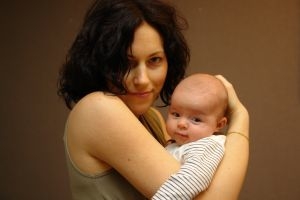So you've decided to start a family, and baby makes three–but sometimes, it's not as easy as that.
Dr. William Dodds, M.D., is the founder of The Fertility Center in Grand Rapids. For more than twenty years, he and his staff of board certified fertility specialists have been working to grow families and bring life into homes all over West Michigan and across the state.
The reason for patients to see Dodds or his colleagues may vary, but with experience and technology, The Fertility Center aims to accurately diagnose men and women who are having trouble conceiving.
"The interesting thing is that I think patients only come to a fertility center like us because they think of more complicated things," Dodds says. "Generally it is the opposite."
Dodds explained three tests he orders for most patients who have been trying for six months to a year or more but have yet to conceive. The tests are "simple" he says, and most of the time, results of the tests help doctors deduce problems and come up with practical, effective solutions.
"I don't believe in forever infertility or forever fertility care. We should be able to get an answer quickly and give the patients choices," he says.
For patients less than 37 years old, the most basic test given evaluates male sperm count. Dodds says 40-50 percent of the time this solves the mystery. The second test gauges female ovulation to determine hormone levels and make sure there is no imbalance that may affect egg development. It also gives results of endometrial lining functionality–the inner membrane of the uterus, and whether cysts are present. These results are attained through an ultrasound. The third test uses an x-ray to evaluate the fallopian tubes to ensure there is no blockage or scar tissue.
"Once I see those three things, do a couple of blood tests…then I pull it all together and see what the options are, what problems there are, and what is going to be most effective," Dodds says.
Sometimes problems conceiving are genetic, sometimes they are due to age. Dodds says women are waiting longer to start families in order to get an education and launch a career. Even so, the first "drop off" age in fertility does not occur until a woman is 32 years old, although the decrease is small. The next milestone is for 35-year-old women, and again for 37-40-year-old women.
"You see quite a bit more problems with pregnancy after 43 or 44. Pregnancy can occur, but it's not very common. It's very unusual. What we say to patients is that if they have been trying for one year or more and they are over 32 (years old), they should definitely have an evaluation," Dodds says.
Another reason for infertility is endocrine polycystic ovary disease.
"That's a big word, but it's the most common endocrine abnormality in women. Women that have it know they have it or may have been told but probably don't know as much as they should," Dodds says.
The hallmarks for the disease are irregular or skipped periods including cycles that last thirty to eighty to ninety days, weight increase, hair growth on the face–chin, side burns, upper lip–or acne that occurs after the age of 28 years old.
"By definition, (the disease) requires two to three of these things," Dodds says.
Even so, one easy step toward fertility is implementing a healthier lifestyle. Weight loss and certain food choices can bring women and men closer to conceiving. Dodds recommends women who are having trouble conceiving aim for 7-10 percent weight loss. Other solutions may involve surgery or medication.
But for Dodds' patients and soon-to-be parents, it's no longer a question of to be or not to be. Technology and testing pinpoint the cause for decreased ability to conceive and help doctors to formulate a solution to what Dodds calls "a medical condition."
"I think that if women and their husbands know they want to have families, they know the technology is available, and they know it can be done safely," Dodds says.
Written by: Erika Fifelski is the West Michigan Woman magazine editorial coordinator. She was born and raised in West Michigan, and after a brief stint on the sunrise side, she's home and loving it. Erika enjoys cooking, vacuuming, and discovering new ways to live sustainably and support local businesses.




